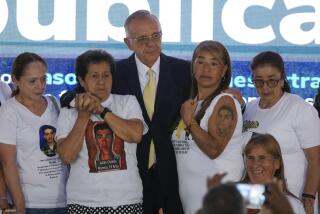Chavez says rebels aren’t terrorists
- Share via
BOGOTA, COLOMBIA — Colombian officials reacted angrily Friday to Venezuelan President Hugo Chavez’s proposal that the rebel group that released two longtime hostages Thursday be reclassified as “belligerents” instead of “terrorists” as a condition of his facilitating the release of more kidnap victims.
Chavez’s speech, in which he railed against the United States for allegedly pressuring Colombia to classify the Revolutionary Armed Forces of Colombia, or FARC, as a terrorist group, came the day after Venezuelan helicopters plucked hostages Clara Rojas and Consuelo Gonzalez from the Colombian jungle and took them to Caracas, the Venezuelan capital.
Speaking to Venezuela’s national assembly, Chavez called on South American and European nations to strike the rebels from their list of terrorist groups. “The FARC and the ELN are not terrorist bodies -- they are armies, real armies,” Chavez told lawmakers. ELN are the Spanish initials of the National Liberation Army, a smaller Colombian guerrilla group.
“They are insurgent forces who occupy space and who have a political plan,” Chavez added.
He has acknowledged admiring FARC and its leader, Manuel Marulanda. Some Colombian officials suspect Chavez of directing the Venezuelan military to look the other way when FARC rebels enter and occasionally camp in Venezuelan territory.
FARC released the two hostages as a gesture of gratitude to Chavez. An earlier attempt to release the two women and Rojas’ 3-year-old son fell apart amid revelations that the youngster was no longer in FARC custody but in a government-run foster home in Bogota under another name.
The distinction between terrorists and belligerents is an important one under international law, because terrorists are not guaranteed prisoner of war rights under the Geneva Convention. Most countries also consider any dealings with terrorists to be a crime.
Colombian Interior Minister Carlos Holguin described the Chavez proposal as “out of line.” The office of President Alvaro Uribe issued a statement saying that the rebels fit the definition of terrorists, because they continue to kidnap and kill. FARC members have abandoned “their old ideas of Marxist revolution” to become drug traffickers, the statement said.
FARC is believed to be holding more than 700 hostages, including three U.S. defense contractors.
In an interview, former Colombian President Andres Pastrana described Chavez’s proposal as blackmail and interference in Colombian state affairs.
Rojas and Gonzalez spoke from Caracas on Friday of the conditions they endured in jungle captivity for more than five years. Gonzalez told Grupo W Radio of Bogota that most prisoners were chained even while bathing and sleeping.
Rojas said she was never able to tell the rebel father of her child, Emmanuel, that she was pregnant. He vanished before she gave birth in 2004. She does not know where he is, she said.
Rojas also said she didn’t know the whereabouts of presidential candidate Ingrid Betancourt, who was kidnapped with her in 2002. Rojas, who was Betancourt’s campaign manager, said she hadn’t seen her in three years and that they had a falling-out after they were taken hostage.
Gonzalez said she walked 20 days to the site near the jungle town of San Jose del Guaviare where rebels delivered her to a delegation that included Red Cross officials and the Venezuelan Interior Minister Ramon Rodriguez Chacin.
Neither woman said when they might return to Colombia.
“We have to do whatever is necessary to free the other hostages,” Gonzalez said, adding that she views Chavez’s activities not as interference but as “a humanitarian effort.”
In a communique posted on the Venezuelan state news service website, FARC reiterated demands that two municipalities near Cali be cleared of all government armed forces as a prerequisite to a broader prisoner swap.
Uribe has rejected the demand, proposing instead a smaller, predetermined “rural area” where hostages could be exchanged for suspected rebels in custody, where neither side could enter with arms.
--
Kraul is a Times staff writer and Gonzalez an special correspondent.
More to Read
Sign up for Essential California
The most important California stories and recommendations in your inbox every morning.
You may occasionally receive promotional content from the Los Angeles Times.












